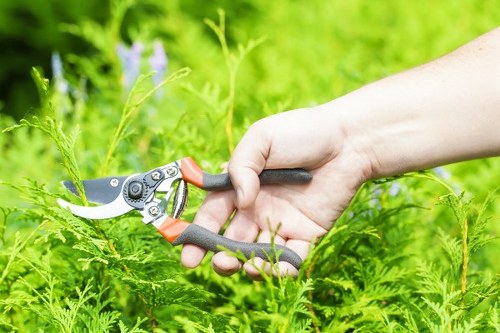Lawn Mower Ham: Your Comprehensive Guide to a Well-Maintained Lawn

Maintaining a beautiful lawn requires the right tools, and a lawn mower is undoubtedly one of the most essential. Whether you're a homeowner looking to keep your garden pristine or a professional landscaper, understanding the nuances of your lawn mower can make all the difference.
In this article, we'll delve deep into the world of Lawn Mower Ham, exploring the various types, maintenance tips, and how to choose the best mower for your needs. Our goal is to provide you with comprehensive information that is both useful and easy to understand.
By the end of this guide, you'll be equipped with the knowledge to keep your lawn looking its best all year round.

Types of Lawn Mowers
Choosing the right type of lawn mower is crucial for achieving the desired look and maintaining the health of your grass. Here are the most common types:
- Push Mowers: Ideal for small to medium-sized lawns, these mowers are eco-friendly and easy to maneuver.
- Self-Propelled Mowers: Suitable for larger lawns, these mowers require less effort as they drive themselves forward.
- Electric Mowers: Quiet and low-maintenance, electric mowers are perfect for those looking for an environmentally friendly option.
- Gas-Powered Mowers: Offering more power, these mowers are ideal for large, tough lawns but require more maintenance.
- Riding Mowers: Best for very large lawns, riding mowers can cover extensive areas quickly.

Push Mowers
Push mowers are the most traditional type of lawn mowers. They're manually operated, which means you have complete control over the mowing speed and direction.
Advantages:
- Cost-effective
- Low maintenance
- Environmentally friendly
Disadvantages:
- Not suitable for large lawns
- Requires physical effort

Self-Propelled Mowers
Self-propelled mowers are a step up from push mowers. They have a drive system that propels the mower forward, making it easier to mow larger areas.
Advantages:
- Reduces physical effort
- Faster mowing
- Better suited for uneven terrain
Disadvantages:
- More expensive
- Higher maintenance

Electric and Gas-Powered Mowers
Electric mowers are gaining popularity due to their quiet operation and eco-friendly nature. They come in both corded and cordless models.
Gas-powered mowers, on the other hand, provide more power and are better suited for large or rugged lawns. They require regular maintenance, including oil changes and spark plug replacements.
Choosing between electric and gas-powered mowers depends on your specific needs and the size of your lawn.
Maintenance Tips for Your Lawn Mower
Keeping your lawn mower in top condition ensures efficient performance and extends its lifespan. Here are some essential maintenance tips:
- Regular Cleaning: Remove grass clippings and debris after each use to prevent rust and keep the mower running smoothly.
- Blade Maintenance: Sharpen the blades at least once a season to ensure a clean cut and promote healthy grass growth.
- Oil Changes: For gas-powered mowers, change the oil at the recommended intervals to maintain engine performance.
- Air Filter Replacement: Replace the air filter as needed to ensure proper airflow and engine efficiency.
- Battery Care: For electric mowers, keep the battery charged and store it in a cool, dry place during the offseason.
Choosing the Right Lawn Mower for Ham
Ham residents have specific needs when it comes to lawn care, given the area's unique climate and landscape. Here are some factors to consider when selecting a lawn mower:
- Lawn Size: Smaller lawns may benefit from push or electric mowers, while larger lawns might require self-propelled or riding mowers.
- Terrain: Uneven or hilly areas may necessitate a self-propelled mower for easier navigation.
- Grass Type: Different grass types may require specific cutting heights or blade types.
- Environmental Impact: Consider electric mowers if you're looking to reduce your carbon footprint.
- Budget: Determine your budget and find a mower that offers the best features within your price range.
Local Relevance: Lawn Mower Services Near Ham
If you're in Ham or the surrounding areas, you'll find numerous services and stores that cater to your lawn mower needs. Here's a list of the closest areas to Ham that offer excellent lawn mower services:
- Burdum: Just 5 miles from Ham, Burdum offers a range of lawn care services and mower repairs.
- Chatham: Located 7 miles away, Chatham is known for its garden centers and maintenance workshops.
- Duling: 10 miles from Ham, Duling provides both sales and servicing of various mower types.
- Eagleton: Eagleton, at 12 miles distance, has specialized stores for electric and gas-powered mowers.
- Fairview: 15 miles away, Fairview is a hub for professional landscapers and equipment rentals.
- Glenwood: Situated 18 miles from Ham, Glenwood offers comprehensive lawn care solutions.
- Hillside: 20 miles away, Hillside features several retail outlets for lawn mower accessories.
- Irving: Irving, 22 miles from Ham, is popular for its eco-friendly lawn care options.
- Jennings: At 25 miles distance, Jennings has numerous mower dealerships and repair shops.
- Kingsport: 28 miles from Ham, Kingsport offers both sales and servicing for high-end mowers.
Each of these areas has its own unique features, making them ideal destinations for all your lawn mower needs.
Benefits of a Well-Maintained Lawn
A well-maintained lawn not only enhances the beauty of your home but also provides several other benefits:
- Environmental Impact: Healthy lawns contribute to reducing carbon dioxide levels and provide oxygen.
- Property Value: A manicured lawn increases the curb appeal and overall value of your property.
- Recreational Space: A lush lawn provides a perfect space for outdoor activities and relaxation.
- Pest Control: Regular mowing can help manage pests by removing hiding spots.
- Soil Health: Cutting grass promotes deeper root growth and improves soil aeration.
Common Lawn Mower Problems and Solutions
Even with regular maintenance, lawn mowers can encounter issues. Here are some common problems and their solutions:
- Mower Won't Start: Check the fuel level, spark plug, and air filter. Replace or clean as necessary.
- Uneven Cutting: Dull or bent blades can cause uneven cuts. Sharpen or replace the blades.
- Struggling to Push: This could indicate a problem with the mowing deck or engine. Inspect and repair any issues.
- Excessive Vibration: Loose parts or an imbalanced blade can cause vibrations. Tighten all components and ensure the blades are balanced.
- Mower Leaks: Oil or fuel leaks can be caused by damaged seals or gaskets. Replace any faulty parts immediately.
Safety Tips for Using Lawn Mowers
Using a lawn mower safely is paramount to prevent accidents and injuries. Here are some essential safety tips:
- Wear Protective Gear: Always wear sturdy shoes, long pants, and eye protection.
- Clear the Area: Remove any debris, stones, or toys from the lawn before mowing.
- Inspect the Mower: Check for any loose parts or damages before each use.
- Avoid Wet Grass: Mowing wet grass can cause slipping and uneven cutting.
- Disconnect the Spark Plug: When performing maintenance, always disconnect the spark plug to prevent accidental starts.
- Be Cautious on Slopes: Mow across slopes rather than up and down to maintain control.
Innovations in Lawn Mower Technology
The lawn mower industry has seen significant advancements in recent years, making mowing easier and more efficient:
- Battery-Powered Mowers: Offering longer run times and quicker charging, battery-powered mowers are becoming increasingly popular.
- Smart Mowers: Equipped with GPS and smartphone connectivity, smart mowers can be programmed for automated mowing schedules.
- Mulching Technology: Enhances grass health by finely chopping clippings and returning nutrients to the soil.
- Zero-Turn Mowers: Provide superior maneuverability, allowing for tight turns and efficient mowing in complex landscapes.
- Robotic Mowers: Fully autonomous, these mowers handle all mowing tasks with minimal human intervention.
Environmental Considerations for Lawn Mowers
Choosing an environmentally friendly lawn mower can significantly reduce your carbon footprint:
- Electric vs. Gas-Powered: Electric mowers produce no direct emissions, making them a greener choice compared to gas-powered models.
- Emissions Standards: Look for mowers that comply with the latest emissions regulations to minimize environmental impact.
- Energy Efficiency: Modern mowers are designed to use less energy while maintaining high performance.
- Recycling and Disposal: Properly recycle old mower parts and dispose of oil and other fluids responsibly.
Cost Considerations When Buying a Lawn Mower
Investing in a lawn mower involves considering both the initial cost and ongoing expenses:
- Initial Purchase Price: Prices vary widely based on type, brand, and features. Determine your budget before shopping.
- Maintenance Costs: Regular maintenance is essential for longevity. Factor in the cost of parts and servicing.
- Fuel or Electricity: Gas mowers require ongoing costs for fuel, while electric mowers need electricity for charging.
- Replacement Parts: Blades, filters, and other parts will need periodic replacement.
- Storage: Consider the cost of storing your mower, especially for seasonal models.
DIY Lawn Mower Maintenance
Many maintenance tasks can be performed at home, saving you time and money:
- Cleaning the Deck: Use a brush or hose to remove grass clippings and debris after mowing.
- Sharpening Blades: Remove the blades and use a file or grinder to sharpen them.
- Changing Oil: Follow the manufacturer’s instructions to drain old oil and refill with fresh oil.
- Replacing Air Filters: Remove and replace old air filters to ensure proper airflow.
- Tightening Screws and Bolts: Regularly check and tighten any loose parts to maintain mower stability.
Professional Lawn Mower Services in Ham
While DIY maintenance is beneficial, some tasks are best left to professionals:
- Engine Repairs: Complex engine issues should be handled by certified technicians.
- Blade Balancing: Professionals can ensure blades are properly balanced to prevent vibrations.
- Seasonal Maintenance: Comprehensive checks and tune-ups before and after the mowing season.
- Customization: Installing aftermarket parts or upgrading mower features.
Conclusion
Choosing and maintaining the right lawn mower in Ham is essential for a beautiful and healthy lawn. By understanding the different types of mowers, following regular maintenance practices, and knowing when to seek professional help, you can ensure your lawn remains a source of pride and enjoyment.
Invest in quality tools, stay informed about the latest technologies, and take proactive steps to care for your mower. With the right approach, mowing your lawn can be a straightforward and rewarding task.
Frequently Asked Questions

1. How often should I mow my lawn?
The frequency of mowing depends on the grass type and growth rate. Generally, mowing once a week during the growing season is recommended.
2. What is the best time of day to mow the lawn?
Mowing in the late morning or early evening is ideal, as the grass is dry and temperatures are cooler, reducing stress on the plants.
3. How high should I set my mower blades?
Setting your mower blades to about 2.5 to 3 inches helps promote healthy grass growth and reduces weed competition.
4. Can I use my lawn mower in wet conditions?
It's best to avoid mowing wet grass, as it can clog the mower and lead to uneven cutting. Wait until the grass has dried for optimal results.
5. How do I store my lawn mower during the offseason?
Clean the mower thoroughly, drain the fuel, and store it in a dry, sheltered area. For electric mowers, ensure the battery is charged and stored properly.